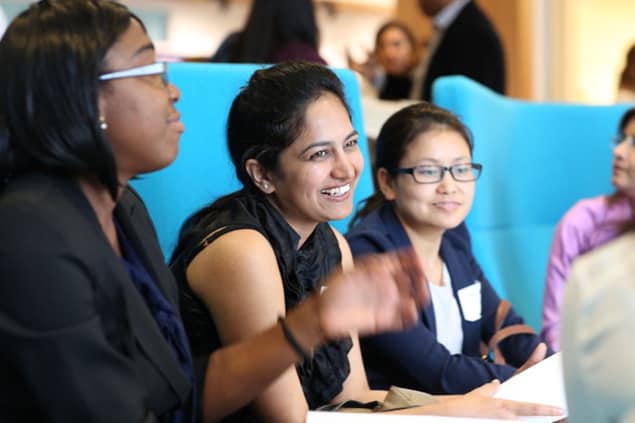WES Global Talent Bridge is publishing a series of blog posts that highlight the critical work and unique perspectives of IMPRINT network members.
This month, WES Global Talent Bridge communications and policy consultant Sara McElmurry connected with Jina Krause-Vilmar, president and CEO of Upwardly Global, a national non-profit that eliminates employment barriers for immigrant and refugee professionals and advances the inclusion of their skills into the U.S. economy. A founding member of the IMPRINT coalition, Upwardly Global has played a key role in shaping and championing the bipartisan Improving Opportunities for New Americans Act, reintroduced in Congress last month.
Upwardly Global has spent two decades connecting immigrants and refugees with commensurate employment opportunities and high-demand training. What do you see as the most challenging barriers facing immigrant and refugee job seekers?
At least two million college-educated immigrants and refugees are unemployed or underemployed in the U.S.; 60 percent of these individuals have international credentials. Over the years, Upwardly Global has met thousands of these job seekers. They are often working in minimum wage jobs that don’t make full use of their education, training, or skills. They are surviving as rideshare drivers, cashiers, or clerks, even though they built careers as physicians, engineers, or IT professionals before coming to the U.S.
Multiple factors drive these numbers. Because states and employers do not recognize their international credentials, immigrants and refugees are often required to repeat training they have already completed abroad. What’s more, access to relevant adult education and workforce development programs is limited because programs are often not tailored to meet the needs of professionals. Finally, Upwardly Global served job seekers from more than 125 countries last year; we’ve seen firsthand that bias around race, religion, language, and country of origin can also affect employment opportunities.
These barriers are systemic in nature. They are intersectional. And they are not widely understood.
The Improving Opportunities for New Americans Act has recently been reintroduced in Congress. How can this legislation catalyze change?
We’ve been encouraged by the bipartisan support of this bill. It reflects a growing consensus that we can no longer afford to have millions of people prevented from fully contributing their education, skills, and training to the economy—especially now.
The legislation calls for an interagency, federal-level study of the employment barriers that drive underemployment in our community. The intersectional nature of the study reflects the complexity of the issue, and the federal lens will help prepare us at all levels—federal, state, local—to better integrate this untapped talent into the U.S. economy. Governmental involvement in driving solutions is critical as we seek to tackle inclusion in earnest and at scale.
We’ve seen other important legislation that prioritizes immigrant and refugee integration and inclusion introduced in this session of Congress. Why is this policy focus needed at this time?
Our country’s economic competitiveness and vibrancy is dependent on the inclusion of underrepresented communities–including immigrants and refugees–in our workforce. The numbers illustrate what’s at stake in getting this right. In 2017, more than 60 percent of newly arrived immigrants age 25 or older had at least a bachelor’s degree. By 2050, 83 percent of growth in the working-age population will come from immigrants and their children.
It’s encouraging to see bills like the New Deal for New Americans and the U.S. Citizenship Act take a more intersectional approach to equity and workforce development, ensuring that our systems intentionally include immigrant and refugee talent and serve our local communities, employers, and economies.
Some barriers to immigrant and refugee employment exist at the state level. How can these more local challenges be addressed?
States regulate professional licensing in heavily regulated industries like architecture, engineering, education, law, and health care. Across states and industries, the shared challenge is that policies largely fail to value international credentials and training, meaning that immigrants and refugees must cut through red tape, and repeat training that they’ve already completed abroad.
Internationally trained physicians, for example, will often invest five or more years and tens of thousands of dollars to repeat the U.S. Medical Licensing Exam (USMLE) and complete another medical residency before they are able to practice medicine in the U.S. Given the time and expense involved in relicensing, it’s not surprising that at least 165,000 immigrants and refugees with international health degrees are unemployed or underemployed.
The COVID-19 pandemic prompted leaders to take temporary actions to address these barriers. Six states issued executive orders that allowed immigrant and refugee health care professionals to serve on the front lines, providing direct care to patients. These models illustrate that policies can be reimagined, and these temporary changes should now pave the way for longer-term reforms. We’ve seen Washington, Missouri, and Minnesota pass innovative legislation that opens pathways and opportunities for internationally trained health workers, and we hope that other states will soon follow.
How can non-government actors support work that enables immigrant and refugee workforce inclusion?
The global pandemic and the growing call for racial and economic justice across the U.S. underscore the need for leaders to ensure that our economic recovery is inclusive and centers on groups that were previously underrepresented or excluded. This change won’t happen in a vacuum. Employers, non-profit partners, policymakers, and philanthropy—each has a role to play.
Employers can re-evaluate recruitment and hiring practices, take steps to build diverse talent pipelines, and open access to opportunity through internships, apprenticeships, and returnships. The non-profit sector, including workforce development organizations, can invest in job placement in mid- and senior-level roles and break down barriers to job placement and career advancement for immigrants and refugees with international credentials. Policymakers can help level the playing field through investments in English language learning, workforce training, and wraparound services, and by advancing policies that recognize international credentials. Philanthropy can invest in this community and scale promising programs and practices. At the same time, we all need to be building cultures of belonging that are shaped by the diversity of our workforce.



